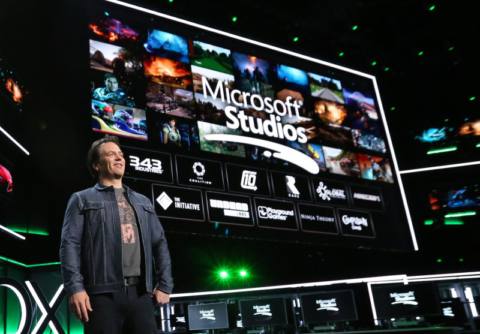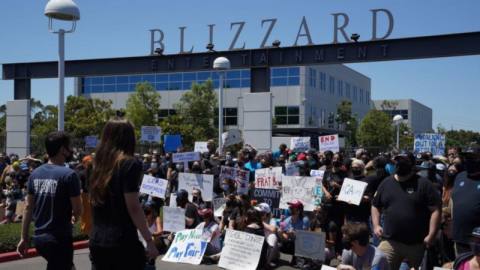
In an audio interview with Kara Swisher of The New York Times, head of Xbox Phil Spencer spoke on a variety of topics surrounding the Xbox brand, including his company’s response to the myriad of ongoing sexual harassment, assault, and gender discrimination lawsuits at Activision Blizzard. Spencer had previously told his staff in an open letter that leadership was “evaluating all aspects of our relationship with Activision Blizzard and making ongoing proactive adjustments.” He clarified what that means as well as the publisher’s larger philosophy on maintaining relationships with partners embroiled in workplace controversy.
When asked to describe how exactly Xbox has changed its business practices with Activision, Spencer stated he couldn’t publicly discuss specifics, only saying, “We have changed how we do certain things with them, and they’re aware of that.”
He went on to say that Xbox’s mission isn’t about “virtue-shaming” other studios, admitting that its own record on such matters “is not spotless.” Spencer specifically brings up Xbox’s 2016 Game Developers Conference dance party that featured half-naked female performers, an event he later apologized for. He states that the situation served as a catalyst for the team to become better. Because of this, Spencer says he wants to use those lessons to focus on helping companies improve their culture rather than to strictly punish them.
“And I really, honestly, I apply most of my energy in that space. And any of the partners that are out there, if I can learn from them or I can help with the journey that we’ve been on [at] Xbox by sharing what we’ve done and what we’ve built, I’d much rather do that than get into any kind of finger-wagging at other companies that are out there.”
“I don’t think my job is out there to punish other companies,” says Spencer.

Swisher then pressed Spencer on how Xbox can reconcile doing business with a company whose allegations include multiple counts of sexual assault against female employees, including rape, as well as one reported instance of suicide due to sexual harassment. Especially when CEO Bobby Kotick evidently knew of these issues for years and did little to address them while obscuring the details from shareholders.
In terms of responding to these issues in a broader sense, Spencer believes that change requires making workers feel safe about reporting toxic practices by maintaining open lines of communication. “And to get there, it’s a cultural effort of how do you build that trust so people feel like when they whistle blow, when they raise their hand about topics that are going on, that they won’t face repercussions,” says Spencer. “Rather, they’ll see action.”
Addressing Bobby Kotick’s allegations, Spencer explains, “I would say in terms of individuals that are in leadership positions at other companies, it’s not obviously our position to judge who the CEOs are. Like, CEOs are chosen by shareholders and boards. At Xbox, I know who I’m accountable for here in terms of the business and the operations. It’s my teams here, my management chain. And that’s the thing that we continue to focus on, is to try to grow. And whether that’s us sharing, again, the experiences that we have with other partners, if we can help them on their own journey or on the things that happen in our own teams.”
The full interview is worth a read/listen as Spencer also discusses Xbox’s approach to battling online player toxicity, using Xbox Live as a platform for free speech, his opinion on the metaverse, the pandemic’s effect on Xbox sales (spoiler: it’s been very good), and gaming as an addiction.
As previously mentioned, 2021 had not been kind to Activision Blizzard. It has spent the last several months battling major lawsuits from the State of California and the Equal Employment Opportunity Commission (the latter of which it recently settled with), as well as an exodus of employees, either due to being perpetrators of abuse or as victims of it. The publisher is also dealing with a weeks-long strike at Call of Duty support studio Raven Software due to QA team lay-offs.
[Source: The New York Times]
